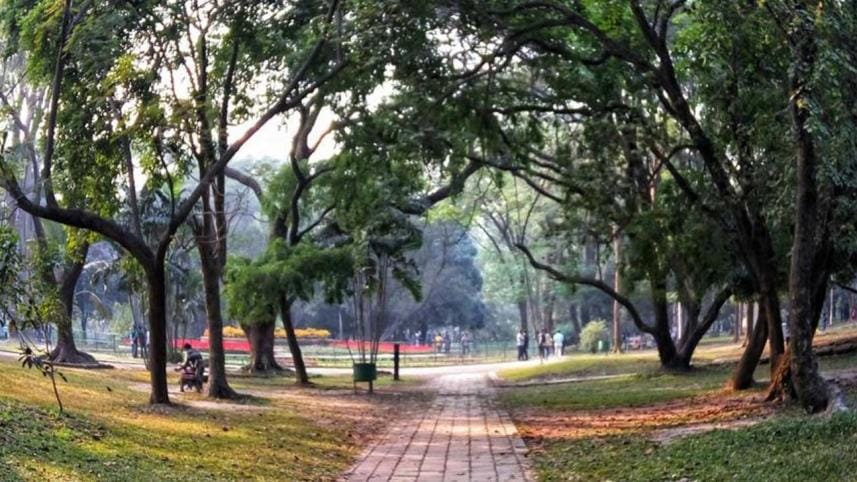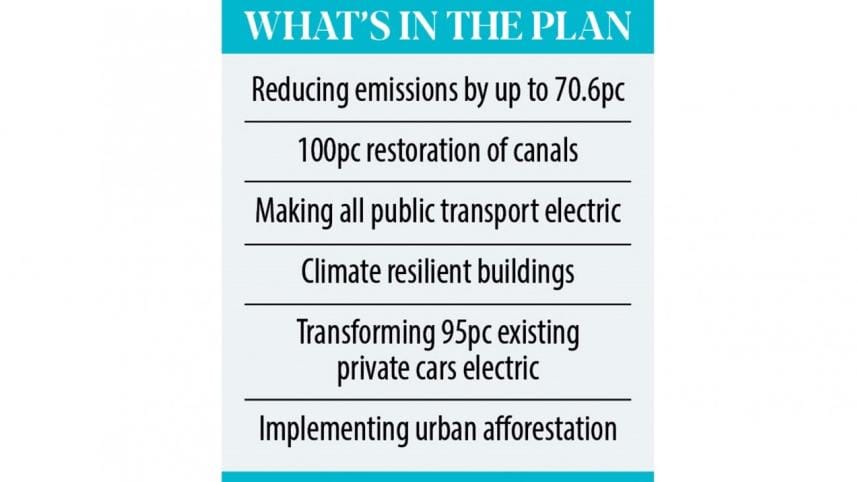‘A green, clean Dhaka by 2050’

Aiming to reduce greenhouse gas emissions by up to 70.6 percent, Dhaka north and south city corporations have initiated first-ever Climate Action Plans towards 2050.
The city corporations have also incorporated 100 percent removal of encroachment and restoration of all canals by 2050 in their respective plans.

Within the same period, all public transport in Dhaka will be electric, and all new buildings will be climate resilient, according to their action plans that were unveiled yesterday at a programme at Dhaka University.
The plans also aimed to transform 95 percent of existing private cars into electric vehicles, while turning 80 percent of existing residential buildings and 70 percent of existing commercial buildings into green buildings.
At the event, Environment, Forest and Climate Change Minister Saber Hossain Chowdhury said this is the beginning of environment-friendly development.
"It will play an important role in building a clean, green and vibrant Dhaka. Although Dhaka has two city corporations, this action plan will treat the city as one. It was fitting to declare 'One Dhaka' to reduce climate change impact on the city of 20 million people," he said.
A certain amount of greenery is necessary to keep the environment of Dhaka habitable and the temperature bearable, said the minister.
"We are trying to implement an urban afforestation project. Special satellite image is being developed for Dhaka, which will be used to decide where trees need to be planted," he added.
Currently, the two city corporations emit around 13.31 million tonnes of carbon dioxide equivalent, with the energy sector accounting for 56 percent, waste for 32 percent, and transport for 12 percent.
In the plans, the city corporations looked forward to a waste-free Dhaka, while ensuring sustainable water supply with wastewater treatment.
By 2050, all the buildings will use energy-efficient electronic or electrical appliances and lighting, and around 85 percent of grid electricity supply will be renewable, the plans also said.
DNCC Mayor Md Atiqul Islam said they have been increasingly bearing the brunt of climate change in recent years.
"Heavy and sudden rainfall -- leading to flooding, waterlogging, and drainage congestion, extreme heat events, and increased risk of vector-borne diseases such as dengue has demonstrated the significance of applying localised mitigation and resilience strategies," he said.
"If Dhaka is the centre of problems, we will also be the centre of solutions. We will re-establish all the canals in Dhaka and it will be the Venice of the East," said Mayor Atiq.
DSCC Mayor Sheikh Fazle Noor Taposh said they have planned to plant 45,000 trees, including 10,000 on both sides of the Buriganga.
"DSCC views climate change as a major humanitarian crisis, and we have prioritised strategic environmental protection measures," he said, adding that they have already renovated some parks and have plans to renovate others.
"Climate migrants arrive in Dhaka every day. By 2050, the city will be more habitable, climate resilient, and eco-friendly for everyone," he added.
Mark Watts, executive director of C40 Cities, a network of nearly 100 mayors of world's leading cities, congratulated both city corporations on their commitment to responding to the climate crisis through the launch of climate action plans.
Dhaka University Vice Chancellor Prof ASM Maksud Kamal, Deputy High Commissioner at the British High Commission at Dhaka Matt Cannell, and Gazipur City Corporation Mayor Jayeda Khatun also joined the programme.
 For all latest news, follow The Daily Star's Google News channel.
For all latest news, follow The Daily Star's Google News channel. 
Comments